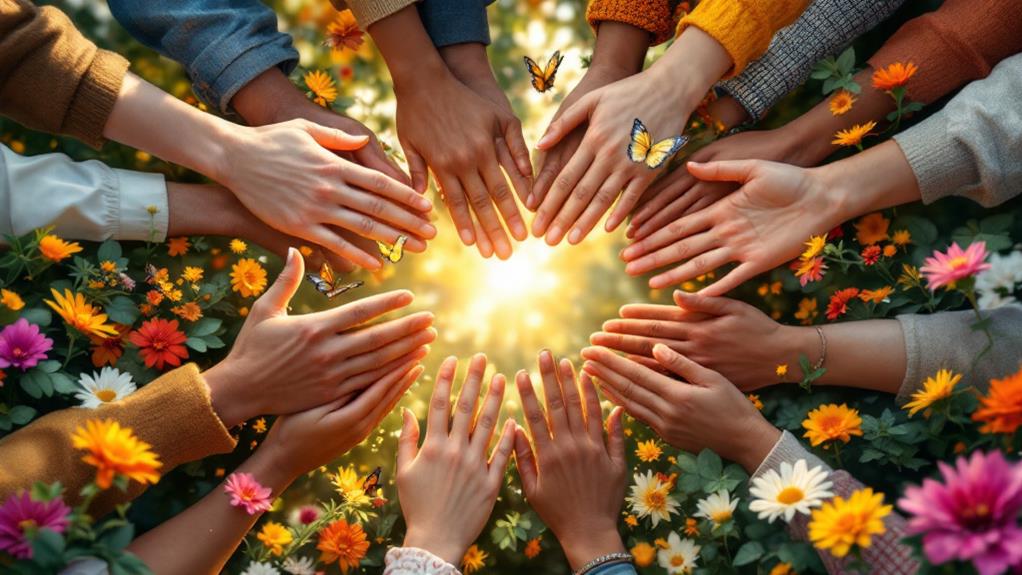Using Random Acts of Kindness to Create Positive Social Change

Random acts of kindness can spark deep social change. You'll find that a single act can influence not just the recipient, but also the giver and witnesses. By practicing kindness, you're challenging societal norms and breaking down barriers between groups. You're also cultivating empathy in your community, which leads to more collaborative and supportive environments. Workplace and school initiatives focused on kindness can revolutionize cultures, improving productivity and emotional intelligence. Even small gestures can make a significant difference, creating a ripple effect of goodwill. By embracing kindness as a catalyst, you're contributing to a societal shift towards compassion and inclusivity. The potential for alteration is boundless.
The Ripple Effect of Kindness
When you perform a random act of kindness, you're not just affecting one person - you're setting off a chain reaction. Your single act can influence the recipient, yourself as the giver, and everyone who witnesses it. This ripple effect extends far beyond the initial interaction, creating a wave of positivity that can transform entire communities.
The power of random acts of kindness lies in their ability to trigger memories of past experiences. When people observe acts of kindness, they're reminded of times they've given or received kindness themselves. This recall can inspire them to pay it forward, perpetuating the cycle of goodwill.
In the workplace, introducing the concept of kindness can revolutionize the entire culture. Small gestures, like offering a helping hand or leaving an encouraging note, can make a significant difference in someone's day and inspire others to follow suit. By encouraging individuals to perform at least one act of kindness daily, you're nurturing an environment where positivity thrives and spreads.
The positive effects of these actions are far-reaching. They elevate morale, improve relationships, and create a more supportive atmosphere for everyone involved.
Overcoming Social Barriers Through Kindness
Kindness has the power to break down even the most stubborn social barriers. When you perform a Random Act of Kindness, especially towards someone from a different background, you're not just helping others – you're challenging societal norms and prejudices. Research shows that these small acts can substantially reduce bias and increase empathy towards marginalized groups.
You can make a real difference by intentionally interacting with and assisting those perceived as "outsiders." This simple act challenges preconceptions and stereotypes, cultivating a more inclusive environment. When others witness your kindness across social divides, it can inspire them to confront their own implicit biases.
In schools and workplaces, kindness-based initiatives have proven effective in improving intergroup relations. By participating in or starting such programs, you're contributing to a more harmonious and understanding society. Remember, every time you extend kindness to someone different from you, you're building a bridge between communities and cultures. Your actions, no matter how small, can create ripples of positive change, gradually eroding the barriers that divide us.
Cultivating Empathy in Communities

Building on the power of kindness to break down social barriers, we can take this concept further by actively cultivating empathy within our communities. By incorporating empathy-building exercises and perspective-taking activities, you'll [HABITAT] greater compassion and understanding among community members. These practices have been shown to increase prosocial behavior and cooperation, creating a more harmonious environment for everyone.
To cultivate empathy effectively, consider implementing these strategies:
- Introduce empathy-focused curricula in local schools
- Organize community events that highlight shared experiences
- Encourage workplace initiatives that model and reinforce empathetic behaviors
Kindness as a Catalyst
Through the lens of catalytic change, random acts of kindness emerge as powerful agents of metamorphosis. When you perform a Random act of kindness, you're not just helping someone in the moment; you're setting off a chain reaction of goodwill. Positive Psychology research shows that witnessing kindness triggers "moral elevation" in observers, inspiring them to engage in prosocial behaviors themselves.
This ripple effect extends beyond individual interactions, influencing entire communities. By incorporating kindness initiatives in workplaces, you can cultivate a more collaborative and supportive culture, leading to increased employee satisfaction and productivity. In schools, kindness-focused programs improve students' empathy and emotional intelligence, creating a more inclusive environment.
You can harness the catalytic power of kindness through community-wide campaigns that encourage and celebrate random acts. These initiatives strengthen social ties, increase feelings of belonging, and promote a shared sense of responsibility for collective well-being. By embracing kindness as a catalyst, you're not just impacting one person's day – you're contributing to a broader societal shift towards empathy, compassion, and positive social change.
Building Resilient Societies
Increasingly, societies are recognizing the essential role of kindness in building resilience. You can contribute to this societal strength through simple acts of kindness that nurture social bonds and community resilience. By engaging in everyday gestures of goodwill, you're not only improving your own health and well-being but also strengthening the fabric of your community.
Research shows that kindness-based initiatives in workplaces and schools enhance collaboration and productivity, creating more resilient organizations. You can be part of this positive change by incorporating acts of kindness into your daily routine. These actions can help vulnerable populations cope with crises and recover more effectively.
To build a more resilient society through kindness, consider:
- Participating in community kindness programs
- Practicing empathy and compassion in your interactions
- Encouraging kindness-focused activities in your workplace or school
Small Actions, Big Impact
Small actions can spark considerable changes in our communities and beyond. When you perform random acts of kindness, you're not just brightening someone's day; you're setting off a chain reaction of positivity. Research shows that witnessing kindness triggers "moral elevation," inspiring others to pay it forward. This ripple effect can transform entire communities, one small gesture at a time.
You don't need to make grand gestures to make a difference. Something as simple as paying for a stranger's coffee or holding the door open can have a deep impact. In fact, performing just one act of kindness per week for six weeks can significantly improve your own life satisfaction and wellbeing.
The power of kindness extends beyond personal interactions. In schools, initiatives like "Random Acts of Kindness Week" cultivate empathy and compassion among students. In the workplace, kindness-based leadership enhances employee retention, engagement, and collaboration. By incorporating these small acts into your daily life, you're not only spreading positivity but also contributing to a more resilient, compassionate society. Remember, every act of kindness, no matter how small, has the potential to create lasting change.
Fostering Inclusivity Through Kindness

Kindness serves as a powerful tool for nurturing inclusivity in our increasingly diverse world. By reaching out to those who feel marginalized or isolated, you can make a significant impact on their mental health and sense of belonging. Simple acts of kindness that cross cultural or socioeconomic boundaries can challenge prejudices and inspire empathy, creating bridges between different groups.
The Acts of Kindness Foundation emphasizes the importance of cultivating inclusivity through intentional kindness. You can contribute to this mission by:
- Initiating conversations with people from different backgrounds
- Participating in community events that bring diverse groups together
- Volunteering for organizations that support underrepresented communities
In workplaces, developing a culture of kindness and inclusion leads to higher employee satisfaction and productivity. By practicing and encouraging kindness in your professional environment, you're not only improving your own experience but also contributing to a more inclusive atmosphere for everyone.
Kindness-Driven Social Transformation
Building on the idea of nurturing inclusivity, kindness-driven social metamorphosis takes the concept a step further by leveraging acts of compassion to create widespread positive change. When you do something nice for someone, you're not just affecting that individual; you're setting off a chain reaction of goodwill that can transform entire communities.
Research shows that witnessing acts of kindness triggers "moral elevation," inspiring others to pay it forward. This ripple effect can lead to community-wide transformation, addressing social issues and cultivating a more collaborative environment. Organizations and governments are catching on, implementing kindness-based initiatives to tackle complex challenges.
You might think, "How can my small act make a difference?" But remember, even the tiniest gesture can be the catalyst for change. One day, your random act of kindness could inspire a movement. From reducing bullying to increasing volunteerism and improving mental health, kindness-focused campaigns have proven their power to create positive social change.




